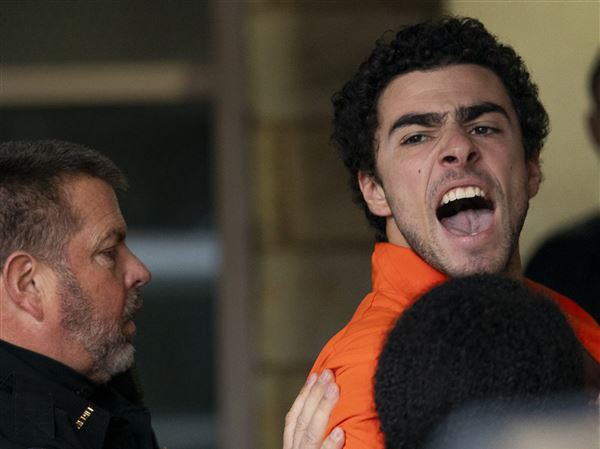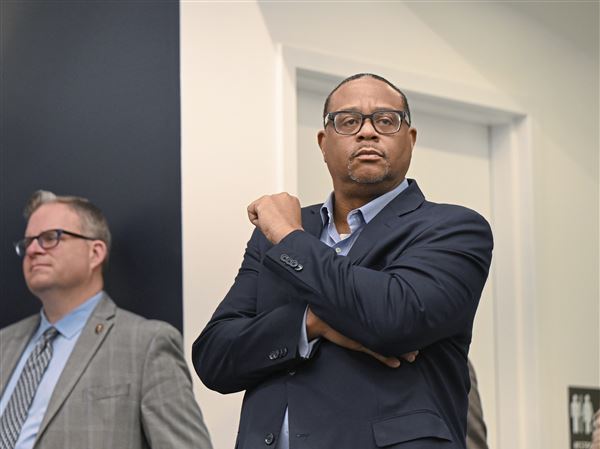The Pennsylvania Cyber Charter School board has axed its director, finance director, personnel director, compliance officer and a longtime lawyer, in a near-sweep of its top management that education experts on Tuesday characterized as highly unusual and potentially damaging in the long term.
It's unclear whether the firings, approved by the school's board late Monday, have anything to do with the search of the school in July by FBI and IRS agents. A federal grand jury is probing current or former executives of the Midland-based school.
A Pennsylvania Cyber spokeswoman confirmed the moves but would not comment further.
Andrew Oberg, the school's fired director, said he believes the school will continue to thrive.
"I have so much confidence in the folks that work here, and I told them at a meeting [Tuesday] that it needs to continue," he said.
The removal of so much of the top management, though, could have ripple effects, said Ralph "Jerry" Longo, an associate professor at Pitt's school of education and former superintendent of the Quaker Valley School District.
"I think when you remove that number of people who are in charge of an organization, obviously there's an impact through the ranks. Everyone becomes nervous with his or her situation."
Along with Mr. Oberg, 43, the board terminated finance director Scott Antoline, personnel director Nancy Yanyanin and compliance officer Judy Shopp. Also dismissed is law firm Barry & Worner of Green Tree, whose attorney, W. Timothy Barry, has long served the state-chartered online school.
The purge leaves in place school CEO Michael Conti and just one of the four directors who used to report to him. It eliminates one of the two law firms the school leaned on for its legal work.
"We are shocked by this development and are entirely unaware of the reason for the termination," wrote Shon Worner, of Barry & Worner, in response to emailed questions.
Ms. Shopp, an attorney, joined Pennsylvania Cyber last year, following a stint as chief counsel at the state Department of Education. While in that post in 2010 under then-Gov. Ed Rendell, she was involved in department demands that the school institute changes to improve transparency in its relationships with vendors. But after Gov. Tom Corbett took office, and Ms. Shopp joined the cyber school, those demands were dropped.
Ms. Shopp also took a post with Avanti Management Group, a firm that works for the cyber school's nonprofit management organization, according to financial disclosures she filed.
Ms. Shopp, Mr. Antoline and Ms. Yanyanin could not be reached for comment.
The state Department of Education is monitoring the situation and will talk with the school, said department spokesman Tim Eller.
There isn't likely to be any immediate impact on the tenor of the cyber classrooms, experts said.
"The way teachers are teaching and classes are operating has not been implicated," William Ouchi, a professor of management and organizations at the University of California, Los Angeles, who specializes in education and is on the board of a network of 22 charter schools, said when told of the news.
But, he added, the board has "removed essentially the entire executive leadership of the school except for the people who actually run the school. ... I've never heard of replacement or termination on that scale short of a declaration of bankruptcy.
"When you have that kind of a mass removal, you worry about the financial viability of the enterprise," Mr. Ouchi said. "That could precipitate a run on the school, because parents are going to try to find another school for their child, and that could be catastrophic for the school."
Pennsylvania Cyber is a public school that does most of its teaching online and is open to students from throughout the state. When a student enrolls with the school, his or her home school is compelled to pay tuition based roughly on its average per-pupil cost.
The school has grown from around 500 students in 2000 to a total now of 10,284 students with around 900 more in the application process. Last year the school graduated nearly 1,300 seniors in what it billed as the largest single graduating class in the state.
In the process, it has become a thorn in the side of many of the traditional public schools whose students -- and then dollars -- have flowed to the online alternative. Last year the struggling Pittsburgh Public Schools, for instance, saw nearly 300 of its students choose the cyber charter. The district paid around $15,000 for each regular education student who opted for a charter school, and around $28,000 for each special education student.
In a time when traditional schools cut staff, cyber charter schools have been flush with cash. State Auditor General Jack Wagner has found that the state's cyber charter schools spend around $3,500 more per student than similar online schools nationally, but spend $3,000 less per student than bricks-and-mortar charters.
While cyber school was out for summer, though, alarm bells rang.
School founder Nick Trombetta quit, replaced by Mr. Conti.
In July, IRS and FBI agents executed search warrants at the school and its major vendors. The school itself does not appear to be the object of the investigation and federal grand jury process. But in July the school hired attorney Robert E. Stewart of the Downtown firm Stewart & Zinski to protect its interests.
A spokeswoman for U.S. Attorney David Hickton's office declined comment.
The Pittsburgh Post-Gazette also has probed the flow of Pennsylvania Cyber's public funds to private nonprofit and for-profit firms run by former veterans of the school.
It is not unprecedented for a board faced with potential legal problems to clean house, said Marian B. Stephens, former superintendent of the California Area School District and now a consultant to attorneys on education cases. "Very often, if there is a problem, and a serious problem, it is up to the board to number one investigate, and number two to work cooperatively with every agency that is a part of the probe, and number three, to act."
The scope of change "seems to be extreme," Mr. Longo said. "I know Andy Oberg personally. ... He's a very bright, good, young man and it's shocking to me. ... He was really committed to that organization."
Mr. Oberg, a former principal for West Allegheny School District, was with the cyber school for seven years and ran its day-to-day operations. He said he was not warned of his firing in advance, could not attend the meeting at which it occurred and was "shocked" when he got the news.
"I don't understand what happened," he said. "It hasn't been explained to us."
Mr. Ouchi said other schools that have faced financial, but not academic, questions have righted themselves. The school, he said, must seek "some person of credibility and integrity who can come in and become the new leader."
Pennsylvania Cyber should also communicate clearly with its students and their parents, Ms. Stephens said. "Level with them! 'We've got a problem. It's not one that we tried to create. Good, bad or ugly, we're trying to solve it.' "
First Published: September 19, 2012, 8:00 a.m.
















